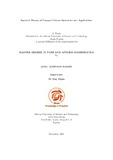| dc.description.abstract | This Project primarily falls into the field of Linear Functional Analysis and its Applications to Eigenvalue problems. It concerns the study of Compact Linear Operators (i.e., bounded linear operators which map the closed unit ball onto a relatively compact set) and their spectral analysis applicable to Fourier Analysis and to the solvability of Fredholm Integral Equations, linear elliptic Partial Differential Equations (PDEs) with the Dirichlet boundary condition, Sturm-Liouville problems, and of Optimization problems.
In this work we do :
- consider the complexification of real Banach spaces (allowing immediate extensions of many results on real Banach spaces and their operators to complex Banach spaces),
- present the Riesz-Schauder spectral theory of compact linear operators which shows that a compact linear operator has a countable set of eigenvalues
having no limit points except possibly 0, and that each nonzero eigen-value has finite multiplicity.
- prove the Fredolhm alternative that states that for every compact linear operator T of a Banach space X and every λ 6 = 0, T − λI is either surjective or non injective, (this extends the theory of linear operators of finite dimensional spaces),
- develop the theory of compact linear self-adjoint operators of Hilbert spaces, which provides the spectral decomposition of compact linear self-adjoint
operators and shows that the norm of any compact linear self-adjoint operator is the maximum of the absolute values of its eigenvalues,
- give examples of compact linear operators which include the Hilbert-Schmidt operators T : L 2 (]0, 1[) −→ L 2 (]0, 1[) with kernel k ∈ L 2 (]0, 1[×]0, 1[) and defined by f 7→ T f with
Z 1 k(x, y)f (y)dy for a. e. x ∈ ]0, 1[ ,
(T f )(x) =0
as well as the Green operator K : L 2 (Ω) −→ L 2 (Ω) where Ω is a non-empty bounded open set of R n ; n ∈ N, and for each g ∈ L 2 (Ω), u = Kg is the unique weak solution of the Dirichlet problem
−∆u = g in Ω
u = 0 on ∂Ω ,
- and use spectral decomposition to solve a Sturm-Liouville problem. | en_US |

